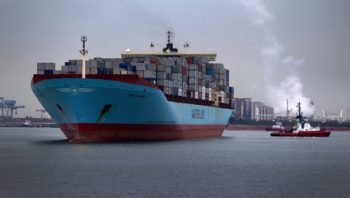
Denmark’s A.P. Moller Maersk gave an upbeat outlook for container shipping on Wednesday, lifting its shares by as much as 4.5 percent as investors looked beyond one-off second-quarter charges and a costly cyber attack on its operations.
Maersk has been hit by low oil prices at its energy arm and sliding prices in its shipping business in recent years due to lacklustre global trade and a glut of available ships for hire.
The firm also said it expected a $200 million to $300 million bill – primarily in the third quarter – from a June 27 cyber attack that disrupted its container shipping operations for weeks.
But its chief executive Soren Skou, who has staked his future on Maersk as a transport business, said the container shipping industry is showing signs of recovery this year as freight rates have picked up, while overcapacity is easing as orders for new vessels fall and existing ones are scrapped.
“Container shipping fundamentals are at their best since 2010,” Skou said following Maersk’s results announcement.
Skou announced plans last September for Maersk to focus on transport, while seeking alliances or a separate listing for its energy division, which includes Maersk Oil. But Maersk has so far revealed little about progress on its plans, and Skou declined to elaborate on Wednesday.
Maersk shares have risen about 80 percent since February, in line with an improvement in the Baltic Dry index, which measures the price of moving raw materials by sea.
Its shares initially fell 3.5 percent after Wednesday’s results before jumping as much as 4.5 percent. By 1310 GMT, they had slipped back to 13,250 Danish crowns, up 1.3 percent.
“There is no material concern on the underlying performance in the quarter, given that the earnings miss is driven by non-cash items,” Nordea analysts said in a note.
Maersk reported a net loss stood of $264 million, compared with expectations for a $507 million net profit, according to an average of forecasts in a Reuters poll.
The loss was largely due to impairment charges of about $700 million in the terminal and tanker business, which Maersk said were due to lower asset valuations in Maersk Tankers and a loss of five contracts in its APM Terminals unit in the first half of the year. Maersk said the loss of contracts was a one-off because APM Terminals signed 18 contracts for new volume.
Maersk also faced a cyber bill of $200 million to $300 million, highlighting the toll on corporate earnings of a June 27 malware attack. Cyence, which helps insurers measure cyber risk, said economic costs from the attack would total $850 million.
Maersk’s loading volumes dipped from typical levels of around 210,000 forty-foot containers to 160,000 in the week following the cyber attack, but had returned to normal by the middle of July, Skou said.
The CEO said he saw no sign of customers turning their backs on Maersk as a result of the attack, however it had kept him from raising full year profit forecast beyond previous guidance.
Maersk had begun to implement a back up plan to limit the impact of a future attack, Skou said, acknowledging the company had not been able to recover IT systems quickly enough.
Skou said an increase in freight rates of 22 percent in the second quarter compared with a year earlier was driven by “good fundamentals” and less overcapacity as demand for moving containers at sea has outpaced the supply of new vessels.
“If you look at our second quarter results, they were driven by higher freight rates alone,” Skou said, adding that he expects vessel overcapacity to fall further.
The company maintained its forecast for a rise in global demand for seaborne container transportation at 2 to 4 percent this year, but said it was now expected in the upper range.
Maersk’s operating profit before depreciation and amortisation (EBITDA) of $2.06 billion was in line with the $2.05 billion forecast by analysts.
Copyright Ships & Ports Ltd. Permission to use quotations from this article is granted subject to appropriate credit given to www.shipsandports.com.ng as the source.